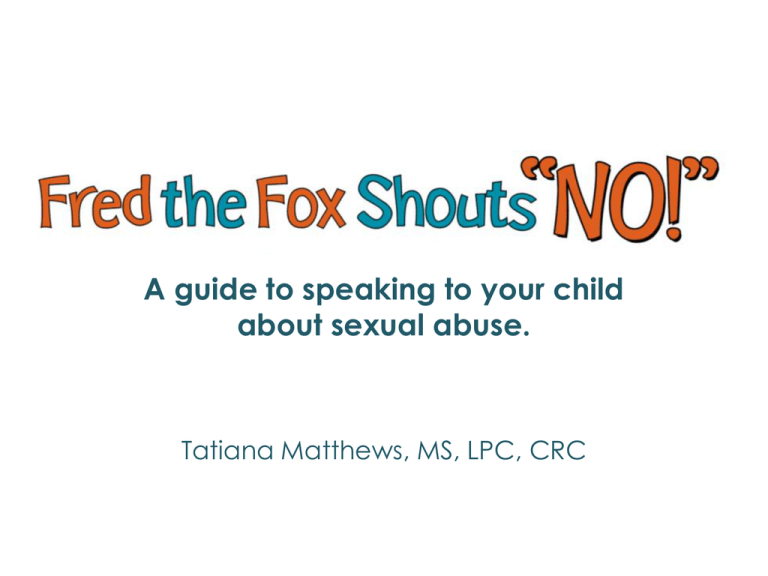
A guide to speaking to your child
about sexual abuse.
Tatiana Matthews, MS, LPC, CRC
Objectives
1. How to prepare parents and caregivers to
start a difficult conversation now!
1. How to teach parents and caregivers how
to have that difficult conversation now!
©2012 Fred the Fox Shouts “NO!”
www.fredthefox.com
Who has experienced one of
these scenarios while presenting?
The “Have You Been Listening?!”
Attendee
• You present all the statistics regarding
frequency and someone asks:
“What if I ‘taint’ my child’s
innocence by educating them?”
©2012 Fred the Fox Shouts “NO!”
www.fredthefox.com
The “I Am Too Vigilant For This”
Attendee
• You present all the statistics regarding
risk with people you know and
someone states:
“Only people I know care for my
children”
©2012 Fred the Fox Shouts “NO!”
www.fredthefox.com
The “My Anxiety About My Child’s
Anxiety is Debilitating” Attendee
• A parent gives a lengthy explanation
about a child’s anxiety and how
introducing this concept will give the
child another thing to obsess about.
©2012 Fred the Fox Shouts “NO!”
www.fredthefox.com
Why Do Adults Respond This Way?
• Scary, overwhelming topic
• Anxiety about doing it “wrong”
• Fear they will hurt their child’s
development (too much too soon
mentality)
• They are confusing sexual abuse
prevention with sex education
• They grew up in a home where “bad”
things were not openly discussed
• They are a survivor of abuse
©2012 Fred the Fox Shouts “NO!”
www.fredthefox.com
How Do We Care for the Caregiver?
We have to nurture the adults whose
lives we touch so that they have the
courage to do what is necessary to
protect children.
©2012 Fred the Fox Shouts “NO!”
www.fredthefox.com
Acknowledge the Fear, But Help
Them Do It Anyway
•
Remind adults why they must do it anyway;
go back to the statistics.
•
It is a scary topic. What else have they
considered scary as part of caretaking that
they had to do anyway?
•
How did they overcome the anxiety to
achieve it for the good of the child?
©2012 Fred the Fox Shouts “NO!”
www.fredthefox.com
Give Adults a Specific Script
•
•
•
•
Fred the Fox Shouts “NO!”
The Swimsuit Lesson (Jon Holsten)
Any book that you have read and would
recommend.
An adult who still does not feel they could
have this conversation can always go to a
professional to help them with it. GCCA
has a list of recommended providers
grouped by county.
©2012 Fred the Fox Shouts “NO!”
www.fredthefox.com
Assist Adults in Role Playing
1. Give adults the words to start the conversation:
– What are our private parts?
– Who is allowed to see your private parts?
– Sometimes people who should not see your private parts
may ask to see them or ask you to see theirs.
– What would you do?
– What would you say? (Yelling “No!”)
– How would you say it?
– Who would you tell?
2. Offer many opportunities to role play “what would
you do” scenarios:
–
Give examples such as hugs that last too long, requests
to touch or see from older people or other kids, sleep
overs, requests to be alone, said they would hurt you or
you will be in trouble, will give you something good
etc…
©2012 Fred the Fox Shouts “NO!”
www.fredthefox.com
The “Scary” Questions Kids May Ask
Why do people do this?
What if they broke in my house?
What if no adults were around?
That would not happen to me if I gave them
the kung-fu karate chop…right?
• That only happens to babies…right?
• What if I wanted to show my private parts for
candy?
• How would they hurt my family if I told?
•
•
•
•
©2012 Fred the Fox Shouts “NO!”
www.fredthefox.com
Encourage Caregivers to Create a
Culture of Empowerment and Respect.
• You have a right to protect yourself, to say “NO!”,
and to privacy. (For example: No bathing suit
changes at the pool in front of everyone, baths with
siblings for parent convenience or diaper changes
without discretion.)
• You don’t have to hug and kiss someone you don’t
want to.
• You don’t have to do something that makes you
uncomfortable no matter what! (Regardless of
someone’s age or what they say they are going to
do if you won’t.)
©2012 Fred the Fox Shouts “NO!”
www.fredthefox.com
Encourage Adults to Use Anatomically
Correct Names for Private Parts.
• Teach them the importance of using
anatomically correct body parts.
• Explain the difference between using
anatomically correct parts and providing a
full sex education session.
• Learn to explain things with the least amount
of words. Answer the questions asked. That’s
it. If another question is asked, then answer
that and so on.
©2012 Fred the Fox Shouts “NO!”
www.fredthefox.com
The “Bubble” is Not Good for the
Child!
• Remind parents that self-esteem and
executive functioning do not develop from
letting our children live in a bubble.
• Teaching children how to problem solve is
where self-esteem and executive
functioning comes from. It literally changes
brain development in a positive way when it
is coupled with healthy support.
©2012 Fred the Fox Shouts “NO!”
www.fredthefox.com
Parents and Caregivers Don’t Have
to Have All the Answers.
• Give adults permission to tell their child, “I
don’t know the answer to your question. I
am going to find the answer and I’ll get
back to you.”
• Kids will respect an adult more who can be
vulnerable and seek help when needed.
What great role modeling!
©2012 Fred the Fox Shouts “NO!”
www.fredthefox.com
Teach adults about the power of
addressing their own history of abuse
• Teach adults about the long term impact on
the human brain and cognitive beliefs.
• Teach adults how their unaddressed abuse
can impact all areas of their life, parenting
included.
• Encourage adults to work towards engaging
in some sort of recovery work either through
therapy, support group or a spiritual
component. One or all would be a good
start.
©2012 Fred the Fox Shouts “NO!”
www.fredthefox.com
How to Get the Most Out of
a Prevention Conversation
Keep it simple
Role Play
Allow your child to be free to shout “NO!” as
loud as he/she can! Be engaging.
Empower your children to set their boundaries
and you will take care of the rest. You have
their back. You will always be there to talk and
they will never be in trouble if they need to talk
with you.
Repetition is key
Revisit the topic often
©2012 Fred the Fox Shouts “NO!”
www.fredthefox.com
The Best Prevention is Education and
Open Communication!
Start the
Conversation
Now!
©2012 Fred the Fox Shouts “NO!”
www.fredthefox.com







